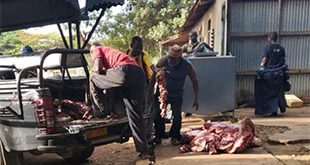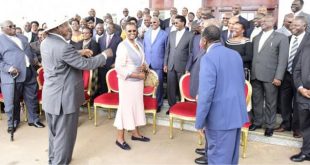Let me be clear: UPDF has not deployed in South Sudan. We do not have even a single soldier in Juba.
— Paddy Ankunda (@defenceuganda) July 10, 2016
Uganda will deploy troops in South Sudan only when requested by the government there, UPDF chief spokesperson Paddy Ankunda has said.
Following break out of fierce fighting and gunfire Sunday night, rumours abound that UPDF troops were already there to ‘put things to order’; however, Ankuda has dispelled such talk, saying not even a single soldier has been deployed there.
“We’re concerned about situation in South Sudan, given likely repercussions, but that’s all. We’re not deployed there,” he said.
#BREAKING A second Chinese @UN peacekeeper dies after critically injured in violence attack in #SouthSudan on Sun. https://t.co/4G1mwWpKVl
— People’s Daily,China (@PDChina) July 11, 2016
Two years ago when fighting broke out in the world’s newest nation, at the behest of the South Sudan government, UPDF Special Forces deployed in the country, manning key installations and providing security to President Slava Kiir.
The elite troops also created buffer zones for safe passage for Ugandans trapped in the country and evacuated those who wished to leave, as most stayed put to exploit business opportunities.
******
Fierce fighting in Juba despite appeals for calm
AFP: Heavy fighting resumed in South Sudan’s capital Juba on Monday despite international calls for calm after deadly gun battles sent thousands of people fleeing and threatened the young nation’s shaky peace.
The United Nations expressed deep alarm over the surge in violence, which has left several hundred people dead and risks plunging the country into a new civil war.
Intense battles resumed Monday with tanks and helicopter gunships deployed and artillery and mortar fire heard in parts of the city.
Insecurity meant planes were unable to arrive or depart the city’s airport.
Witnesses reported “very, very heavy fighting,” with residents barricading themselves inside houses and aid workers holed up in bunkers while the US embassy warned of “serious fighting between government and opposition forces”.
The only civilians on the streets scurried for shelter during lulls in fighting.
The UN Security Council demanded Sunday that President Salva Kiir and his Vice President Riek Machar “do their utmost to control their respective forces, urgently end the fighting and prevent the spread of violence”.
Hundreds killed
The current fighting between soldiers loyal to Kiir, a member of the Dinka tribe, and former rebels backing Machar, a Nuer, was triggered by a deadly altercation at a checkpoint on Thursday night.
That was followed by hours of violent confrontations on Friday evening that left at least 150 dead. Local media gave a higher figure of 270.
After a pause on Saturday — South Sudan’s fifth anniversary of independence — battles began in earnest on Sunday morning, continuing throughout the day in several parts of the city before subsiding overnight and resuming Monday.
It is unclear how many have been killed since Sunday.
The clashes are the first between the army and ex-rebels in Juba since Machar returned to take up the post of vice president in a unity government in April.
The violence marks a fresh blow to last year’s peace deal which has failed to end the civil war that broke out in December 2013, when Kiir accused Machar of plotting a coup.
The war has been characterised by rape, ethnic massacres, attacks on civilians, the use of child soldiers, pillage, widespread destruction of property and displacement of the population.
The Security Council on Sunday pressed South Sudan’s neighbours to help end the renewed fighting, asking for extra peacekeepers as well as demanding that Kiir and Machar rein in their forces.
It called for the two rivals to “genuinely commit themselves to the full and immediate implementation of the peace agreement, including the permanent ceasefire and redeployment of military forces from Juba.”
UN Secretary General Ban Ki-moon said he was “shocked and appalled” at the violence in the world’s youngest nation.
Regional leaders plan to hold a special summit in Nairobi on Monday.
An appeal for calm by the South Sudan Council of Churches, representing the country’s bishops, was played repeatedly on the radio from Sunday while a South Sudanese civil society organisation said civilians had taken shelter in churches.
“We condemn all acts of violence without exception. The time for carrying and using weapons has ended, now is the time to build a peaceful nation,” the message said.
No ceasefire
South Sudan’s Information Minister Michael Makuei blamed the former rebels for the violence. A “unilateral ceasefire” which Makuei said would be ordered by Kiir failed to materialise late Sunday.
Aid workers said a UN camp housing around 28,000 people previously uprooted by the war had been caught in the crossfire, wounding some civilians.
A steady stream of people clutching children and possessions headed for the hoped-for refuge of another UN base close to the city’s airport on Sunday, only to find fighting erupting there as well. There were also reports of hundreds of South Sudanese crossing into neighbouring Uganda.
South Sudan has seen more fighting than peace since independence in July 2011. The August 2015 peace deal was supposed to end the conflict but fighting has continued despite the establishment of a unity government.
Tens of thousands have died in the violence, with close to three million forced from their homes and nearly five million surviving on emergency food rations.
The humanitarian crisis has unfolded alongside an economic one with the currency collapsing and inflation spiralling out of control. The country’s mainstay oil industry is in tatters and regional towns have been razed.
***
editor@independent.co.ug
 The Independent Uganda: You get the Truth we Pay the Price
The Independent Uganda: You get the Truth we Pay the Price



